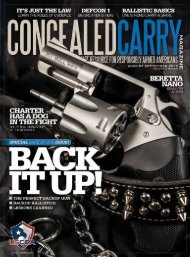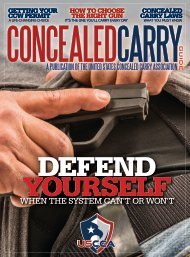Download This Issue - US Concealed Carry
Download This Issue - US Concealed Carry
Download This Issue - US Concealed Carry
Create successful ePaper yourself
Turn your PDF publications into a flip-book with our unique Google optimized e-Paper software.
If you have<br />
only one<br />
option, you<br />
can only<br />
respond to<br />
one type of<br />
situation.<br />
Whether you only have a deadly weapon or only have a collection of joint locks or<br />
only have a sweet disposition and a way with words, hoping you will run into the<br />
right problem to match your skills isn’t a strategy. It’s actually kind of dumb.<br />
Lower Levels<br />
[ BY RORY MILLER ]<br />
“Why should someone who knows how to shoot and carries<br />
a gun also learn how to use lesser levels of force?”<br />
It didn’t sound like a serious question,<br />
at first. More like the kind of<br />
thing you would use to start a conversation<br />
or an argument. Still, it made<br />
me think and sometimes things have to<br />
be put into words.<br />
To begin with, the things that should<br />
be obvious are:<br />
Legally, ethically and practically,<br />
shooting someone is rarely the right answer.<br />
The competing harms doctrine<br />
(see below) stipulates that deadly<br />
force is justified if and only if you believe<br />
yourself or a third party to be in<br />
immediate danger of death or serious<br />
physical injury. Maine’s statutes<br />
on competing harm reads (Maine<br />
of Force<br />
Criminal Code Part 1 Chapter 5):<br />
103. Competing harms<br />
1. Conduct that the person believes<br />
to be necessary to avoid imminent<br />
physical harm to that person or another<br />
is justifiable if the desirability and urgency<br />
of avoiding such harm outweigh,<br />
according to ordinary standards of reasonableness,<br />
the harm sought to be prevented<br />
by the statute defining the crime<br />
charged. The desirability and urgency<br />
of such conduct may not rest upon considerations<br />
pertaining to the morality<br />
and advisability of such statute.<br />
[ 2007, c. 173, §18 (AMD) .]<br />
2. When the person was reckless or<br />
criminally negligent in bringing about<br />
the circumstances requiring a choice of<br />
harms or in appraising the necessity of<br />
the person’s conduct, the justification<br />
provided in subsection 1 does not apply<br />
in a prosecution for any crime for which<br />
recklessness or criminal negligence, as<br />
the case may be, suffices to establish<br />
criminal liability.<br />
[ 2007, c. 173, §18 (AMD) .]<br />
To boil it down, in the eyes of the<br />
courts and in the minds of most humans,<br />
people are more important than<br />
stuff. Some state statutes differ, for instance<br />
Texas Penal Code 2.9.42 reads:<br />
Sec. 9.42. DEADLY FORCE TO<br />
PROTECT PROPERTY. A person is justified<br />
in using deadly force against another<br />
to protect land or tangible, movable<br />
property:<br />
(1) if he would be justified in using<br />
force against the other under Section<br />
9.41; and<br />
38<br />
<strong>US</strong>CONCEALEDCARRY.COM n CONCEALED CARRY MAGAZINE n MAY/JUNE 2011
















